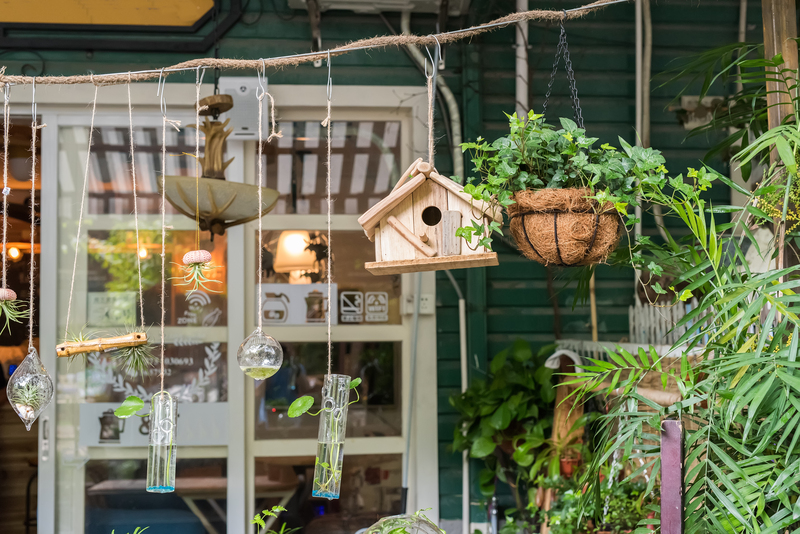Transform Outdoor Spaces by Reducing Plastic Waste
The world is dealing with a plastic waste crisis. Every year, millions of tons of single-use plastics end up in rivers, forests, parks, gardens, and beaches, disrupting ecosystems and spoiling the natural beauty of our environment. However, you can play a crucial role in reversing this trend! By reducing plastic waste in your outdoor spaces, you create healthier, more sustainable, and visually appealing places for people and wildlife alike. Learn actionable strategies to create eco-friendly gardens, parks, patios, and public spaces with minimal plastic pollution.
Why Reducing Plastic Waste Outdoors Matters
Plastic pollution outdoors doesn't just look bad--it poses significant threats to plants, animals, soil, and even our own health. Consider these key points:
- Wildlife Risks: Animals can mistake plastic debris for food, leading to ingestion and fatal blockages.
- Soil and Water Contamination: Microplastics break down and seep into the soil and water, disrupting local ecosystems.
- Human Health: Plastic chemicals may enter the food chain, eventually impacting people.
- Visual Pollution: Accumulated plastic waste diminishes the beauty and enjoyment of outdoor environments.
Addressing these issues begins at the local level. With mindful choices, you can transform your outdoor spaces while inspiring a wider movement.

Assess Your Current Plastic Footprint
Before making meaningful changes, it's important to evaluate the sources of plastic waste in your outdoor settings. Here are some common culprits:
- Plastic gardening pots and trays
- Single-use decorations like banners or balloons
- Plastic packaging left from outdoor events
- Plastic picnicware (cups, plates, utensils)
- Synthetic turf and mulch
- Food wrappers and drink bottles
By identifying where plastics sneak into your garden, park, or patio, you can target your efforts for maximum impact.
Eco-Friendly Alternatives for Outdoor Improvement
1. Switch to Reusable and Biodegradable Products
Eliminate disposable plastics by investing in durable, reusable alternatives or biodegradable materials. Here are some ideas:
- Ceramic, terracotta, or wooden plant pots replace plastic planters effectively and improve aesthetics.
- Bamboo, wooden, or metal utensils offer long-term solutions for outdoor dining.
- Natural fiber banners and tablecloths create festive environments without the waste.
- Biodegradable plant support ties and labels reduce the risk of microplastics in the soil.
2. Choose Sustainable Landscaping Materials
Opt for organic mulch (such as bark, leaves, grass clippings, or coconut coir), natural gravel, and stone instead of plastic or rubber mulch. These options not only reduce plastic pollution but also enrich the soil and foster biodiversity.
3. Rethink Outdoor Furniture and Decor
Many outdoor furnishings are made from PVC or polyester. Switch to products made from recycled metal, sustainably harvested wood, or even upcycled materials. Seek out local artisans or eco-brands committed to reducing plastic waste.
Creative Ways to Repurpose Existing Plastics
Instead of discarding old plastic items, creatively reuse and repurpose them in your outdoor spaces. Here are some innovative ideas:
- Vertical Gardens: Use old plastic bottles or containers to create wall-mounted herb or flower gardens.
- Bird Feeders: Convert plastic bottles into feeders for birds or insects.
- Compost Bins: Repurpose large plastic barrels as compost tumblers to enhance soil health.
- Rainwater Harvesters: Retrofit plastic drums to collect and use rainwater for irrigation.
*Just remember to ensure plastics are cleaned and don't leach contaminants, especially if using in edible gardens.
Organize Community Action to Reduce Outdoor Plastic Waste
Transforming your own garden is impactful, but collective action can lead to exponential benefits in local parks, schoolyards, and neighborhood green spaces. Consider the following steps:
Host Educational Workshops
Arrange local talks or demonstrations about reducing plastic waste outdoors, showcasing eco-friendly products and practices.
Collaborative Clean-Up Events
Organize regular plastic-free clean-up days or "plogging" runs (jogging while picking up litter) to beautify public areas and foster environmental responsibility.
Partner with Local Businesses and Authorities
Encourage event planners, caterers, and local authorities to adopt plastic reduction policies, offering support for alternatives and recycling.
Promote Responsible Outdoor Recreation
- Educate visitors about leaving no trace and packing out all waste, including plastics.
- Install clear signage and ample recycling/compost bins in shared spaces.
- Implement plastic-free guidelines for festivals, sports matches, and outdoor concerts.
Designing Plastic-Free Outdoor Events and Parties
Outdoor entertaining is a joy--but traditionally, it's awash in single-use plastics. Here are essential tips to minimize plastic waste whether you're hosting a birthday, wedding, or picnic:
- Use real tableware: Opt for washable plates, cups, and cutlery instead of disposables.
- Offer bulk water stations: Avoid bottled beverages with refillable pitchers or water coolers.
- Decorate sustainably: Choose flowers, bunting made from cloth or recycled materials, and LED lights over plastic decor.
- Communicate eco-values: Add a note inviting guests to bring reusable items or explaining your zero-waste initiative.
- Compost and recycle: Provide labeled bins for easy sorting of waste.
By applying these changes, your gatherings can be greener--and inspire guests to adopt plastic-reducing habits too!
Harnessing Technology and Innovation
The movement to reduce plastic waste outdoors is powered by smart innovations. Consider integrating these technologies:
Bio-Based Plastics and Eco-Materials
A new wave of biodegradable plastics, derived from corn starch, hemp, or other renewable sources, offers a potential replacement for traditional plastics. Look for labels like PLA (polylactic acid) when purchasing garden supplies.
Solar-Powered Recycling Bins
Modern parks and campuses now utilize solar-powered compacting bins that encourage recycling and reduce overflow--keeping outdoor spaces cleaner and less plastic-ridden!
Plastic-Free Certification and Tracking Apps
Some communities offer certification for plastic-free events or gardens, while mobile apps help individuals and organizations track and reduce their plastic footprint.
Benefits of Plastic-Free Outdoor Spaces
Embracing the mission to reduce plastic waste in gardens and parks brings a cascade of positive outcomes:
- Healthier Wildlife: Less plastic litter means safer habitats for birds, insects, and other creatures.
- Richer Soil and Cleaner Water: Reduced microplastics lead to healthier soil and waterways, benefitting plant growth and aquatic life.
- Aesthetic Appeal: Plastic-free spaces are more visually pleasing, inviting greater use and community pride.
- Educational Value: Eco-friendly gardens and parks serve as living lessons in sustainability for all ages.
- Resilient Communities: Reducing plastic waste fosters a collective sense of stewardship, well-being, and environmental leadership.
Common Challenges and How to Overcome Them
While the shift to sustainable outdoor spaces is rewarding, challenges can arise:
- Initial Costs: Eco-friendly alternatives may have higher upfront costs. Overcome this by seeking bulk discounts or sharing supplies among neighbors.
- Habit Change: Encourage gradual adoption--start with one plastic-free swap at a time.
- Availability of Alternatives: Research local suppliers, online marketplaces, or even DIY approaches to find suitable options.
- Lack of Awareness: Use signage and community outreach to explain the reasons and benefits of reducing outdoor plastic waste.
Case Studies: Outdoor Spaces Leading the Way in Plastic Reduction
Park Slope Community Garden, Brooklyn
By forming a sustainability committee, this urban garden phased out all plastic planters, synthetic mulches, and single-use decorations. The community now shares tools and composts all organic waste, serving as a model for eco-friendly gardening.
The Plastic Free Park Initiative (UK)
In towns across the UK, public parks have installed clearly marked bins, banned plastic straws and packaging from vendors, and provided education on plastic pollution's effects. Bird and insect counts have risen, and the parks have earned awards for environmental leadership.

Step-by-Step Action Plan for Reducing Outdoor Plastic Waste
- Audit your current use of plastics in your garden, park, or patio.
- Prioritize swaps from single-use to reusable, biodegradable, or natural materials.
- Develop a disposal and recycling station for unavoidable plastics--and make it accessible and well-labeled.
- Educate friends, family, and community partners on the benefits of reducing plastic outdoors.
- Host or participate in outdoor clean-up events to remove existing plastic waste.
- Monitor your progress, celebrate successes, and continue to reduce plastic waste over time.
Conclusion: Create Lasting Change by Reducing Plastic Waste Outdoors
Transforming outdoor spaces by reducing plastic waste is a tangible, meaningful way to enhance both our environment and quality of life. By making conscious swaps, embracing innovative solutions, and championing communal action, you become part of a global movement to protect our planet for future generations.
Remember: Every plastic-free choice adds up. Start today--your garden, park, or neighborhood will thank you, and so will the Earth!
Looking for more inspiration and guidance? Explore local environmental organizations, zero-waste websites, and join online communities dedicated to sustainable outdoor living.
Let's create plastic-free outdoor havens, one step at a time!